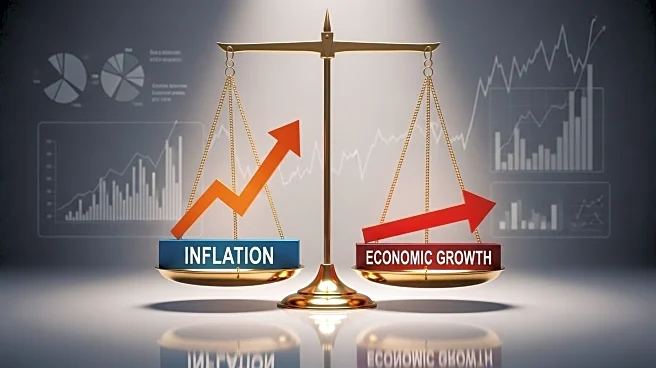What's Happening?
The U.S. economy is showing signs of edging closer to stagflation, a condition characterized by stagnant growth and rising inflation. This development is attributed to policies implemented by the Trump administration, particularly tariffs and immigration crackdowns. Initially, the economy appeared resilient, with stable job growth and a decrease in inflation to 2.3%. However, recent labor market data revisions revealed a significant drop in job figures for May and June, while inflation has climbed to 2.9% as of August. Economists, including Brett House from Columbia Business School, have noted a reversal in growth and inflation expectations due to these policies. The tariffs have begun to impact prices as companies pass costs onto consumers, and the reduced labor supply has increased hiring costs.
Why It's Important?
The potential onset of stagflation poses significant challenges for the U.S. economy, as it limits the Federal Reserve's ability to manage economic stability through interest rate adjustments. Stagflation can lead to increased unemployment and higher living costs, affecting both businesses and consumers. The Trump administration's policies, particularly tariffs, are seen as indirect taxes that could push more Americans into poverty. The situation is further complicated by the uncertainty surrounding the Federal Reserve's upcoming interest rate decisions, which aim to balance the labor market without exacerbating inflation. If stagflation takes hold, it could lead to a prolonged period of economic hardship, with job losses and increased difficulty in finding employment.
What's Next?
The Federal Reserve is expected to consider cutting interest rates in the coming week to support the labor market. However, this move carries risks, as it may not prevent inflation from rising if companies continue to pass tariff costs onto consumers. Economists warn that if stagflation develops, it could lead to a depressive economic environment with increased unemployment and poverty. The Trump administration has urged patience, suggesting that the economic benefits of their policies will become apparent in the future. Meanwhile, stakeholders, including businesses and consumers, will be closely monitoring the Federal Reserve's actions and the ongoing impact of tariffs on the economy.
Beyond the Headlines
The potential for stagflation raises ethical and policy questions about the impact of tariffs and immigration policies on vulnerable populations. The increase in poverty levels due to these policies highlights the need for a balanced approach that considers both economic growth and social equity. Additionally, the situation underscores the importance of transparent and consistent policy implementation to maintain economic stability and public trust.










